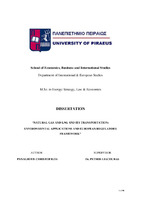Natural gas and LNG and its transportation : environmental applications and European regulatory framework

Master Thesis
Συγγραφέας
Christofilos, Panagiotis
Χριστόφιλος, Παναγιώτης
Ημερομηνία
2023Επιβλέπων
Liakouras, PetrosΛιάκουρας, Πέτρος
Προβολή/
Λέξεις κλειδιά
LNG ; Energy ; European DirectivesΠερίληψη
The significance of liquefied natural gas (LNG) as a traded commodity has grown
significantly in the past decades. Globally, the growing demand of natural gas for power
generation, heating, cooking, large- and small-scale businesses, but also as a feedstock for the
petrochemical industry to produce plastics, fertilizers, and many other products, and due to its
lower environmental impact in comparison to oil and coal, has led natural gas to be
considered as the bridge fuel of a more sustainable transition with regards to climate change,
the Kyoto protocol provisions and the European Union’s Green Deal and its targets for
climate neutrality by 2050. The need for a cleaner fuel than coal and oil in terms of a more
environmentally friendly fuel, the economic and its competitive nature has intensified the
significance of natural gas. In order for the security of supply to be achieved as well as
differentiation of energy sources, the transportation of natural gas in a liquid state has
emerged during the last decades with a soaring demand in countries such as Japan, China,
India and Korea with limited gas pipes infrastructures and limited reach to natural gas. The
market for LNG has become more liberalized with third party access (TPA) privileges to
different exporters while the fleet of LNG carriers has grown significantly in the past
decades, lowering their average year ratio. The emergence of new players in the importing
and exporting side as well as LNG contracts that have become more flexible, enabling at
times arbitrage of LNG cargos, rediverting cargos to different importers. Although the main
target of the developed countries should be the further penetration of renewable sources of
power such as wind, solar and nuclear, due to the seasonality of renewable sources, natural
gas has a pivotal role to play in the energy transition for the upcoming decades. The market
of LNG is worth exploring and the Mediterranean region is responsible for more than 20
percent of the whole LNG consumption, importing LNG from over than 13 different
countries in 2017. The European Union is committed to diversifying its energy sources in the
last decades. The EU has been a pioneer in the development of the LNG chain in its territory,
in the establishment of a liquid, liberalized and transparent natural gas market through the
implementation of gas Directives and energy packages.


